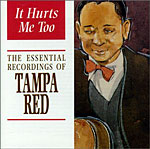
Tampa Red (1904-1981), born Hudson Woodbridge, was an influential American musician. He is best known for his accomplished guitar playing in the blues field, but in a career spanning over 30 years he also recorded pop, R&B and hokum (see below) records.
He was born in Smithville, Georgia, but later moved to Tampa, Florida, which became part of his nickname (the other part came from his red hair). In the 1920s he moved to Chicago, Illinois where he began his career as a musician. His big break was being hired to accompany Ma Rainey and he began recording in 1928 with "It's Tight Like That", in a bawdy and whimsical style that became known as hokum. Early recordings were mostly collaborations with Thomas A. Dorsey (also known as Georgia Tom). Tampa Red and Georgia Tom recorded almost 90 sides, sometimes as "The Hokum Boys" or as "Tampa Red's Hokum Jug Band". He was also a close friend and associate of Big Bill Broonzy. He seems to have enjoyed commercial success and reasonable prosperity, and his home became a centre for the blues community, informally providing rehearsal space, bookings, and even boarding.
Tampa Red is considered an influential figure in the blues, having an impact on Muddy Waters, Elmore James, Big Maceo Merriweather, Mose Allison and many others with his song style and polished bottleneck style. Into the 1930s, he was billed as The Guitar Wizard. He played a National Resonator Guitar, the loudest and showiest guitar available before amplification, acquiring one in the first year they were available. The National guitar he used was a gold-plated tricone, and it has never been found. Tampa Red was known as "The Man With The Gold Guitar".
By the 1940s he was playing electric guitar, and his 1949 recording "When Things Go Wrong with You (It Hurts Me Too)" was covered by Elmore James. He was "rediscovered" in the late 1950s, like many other surviving early recorded blues artists, as part of the blues revival (see e.g. Son House, Skip James). His final, undistinguished, recordings were in 1960.
No comments:
Post a Comment